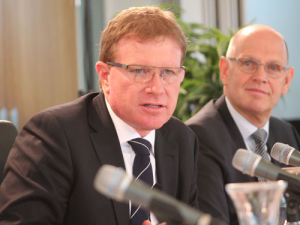Another Windfall for Fonterra Farmers, Unit Holders
Fonterra farmer shareholders and unit holders are in line for another payment in April.
 Fonterra chairman John Wilson (pictured) says all of the 50c increase has been passed to farmers as an advance.
Fonterra chairman John Wilson (pictured) says all of the 50c increase has been passed to farmers as an advance.
Fonterra has for the first time passed all its forecast milk price rise to its cash-strapped farmer suppliers.
The co-op last month announced a 50c increase in its 2016-17 farmgate milk price, lifting it to $5.25/kgMS. Normally farmers get an advance payment – about 70% of the forecast price – then a final payment after the end of the season.
But Fonterra chairman John Wilson says all of the 50c increase has been passed to farmers as an advance.
“This has been done for the first time; it reflects our co-op’s strong balance sheet and acknowledgment of the tough times our farmers are facing out there,” he told Rural News.
Last week, Fonterra directors, including Wilson, held about 45 shareholder meetings to discuss the annual results.
He says farmers appreciate Fonterra’s net profit jumping 65% to $834 million, “but we realise things are difficult on farms right now…. Fonterra has responded by building a stronger balance sheet and getting cash to farmers quicker than we normally do.”
Earlier this year, Fonterra lifted the advance rate and brought forward its dividend payment. Wilson says it’s pleasing to hear farmers appreciate the work the co-op is doing; more needs to be done, he adds.
He says Fonterra’s rural service subsidiary Farm Source is also helping farmers, using scale to buy goods cheaper and passing those savings to farmers. Under Farm Source’s rewards programme, farmers accumulate ‘eligible spend dollars’ -- helpful for sharemilkers and young farmers. It also offers extended credit on farm purchases.
Wilson says Fonterra has been focusing on its balance sheet for three years, working hard to return every possible cent of value back to farmers.
“Our business strategy is serving us well. We are moving more milk into higher-returning consumer and foodservice products while securing sustainable ingredients margins over the GlobalDairyTrade benchmarks, especially in specialty ingredients and service offerings.
“Increased earnings and continuing financial discipline have increased the return on capital and strengthened our balance sheet by significantly reducing debt.”
Fonterra’s milk supply over the past five years has grown at an average of 5% annually and the co-op has built more plant to process the extra milk. More efficient processing has shaved costs by 8%.
Hawke's Bay apple grower Taylor Corporation says a standout 2026 season, coming after a few difficult years, is boosting optimism among growers.
Horticulture New Zealand (HortNZ) has added its perspective to numerous primary sector voices urging the Government to strengthen its draft legislation to replace the Resource Management Act (RMA).
The Commerce Commission has finalised new information disclosure requirements for local councils and water organisations that deliver water supply and wastewater services.
Beef + Lamb NZ (B+LNZ) is calling for significant changes to the Government’s reforms to the Resource Management Act (RMA).
NZPork says the Government needs to strengthen its proposed planning laws to ensure New Zealand's pig farmers can continue to produce pork.
Good news for kiwifruit growers - a record crop with forecast per hectare returns at record levels for all fruit categories for the 2025-26 season.

OPINION: The proverbial has really hit the fan in Wellington and exposed a glaring example of a double standard in…
OPINION: Dark suited spin doctors exist to, well, spin, and the nice cuddly progressive types at Greenpeace Aotearoa practice this…